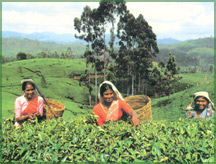|
dailynews |
|
|
|
|
|
OTHER LINKS |

|

|

|
Tea industry facing wage increment hurdleTEA INDUSTRY: Tea Plantations earn 90 percent or more of the foreign income to Sri Lanka. Private tea factory owners earn 60 percent of the export revenue. The profitability of the plantations is very minimal when compared to other industries. The cost of tea production in Sri Lanka is very high. Scarcity of labour is another major fact. The labour cost is really high in contrast to other countries on line. "Every second year labour unions are demanding for wage increments. Which kill the industry drastically. In the case of other industries labour increments are imposed in five years time.
Another wage negotiation is going to be held in November, which will push us further down, General Manager-Finance Agalawatte Plantations Limited, Senerath Devendra said. The European market is demanding a Hazard Analysis and Critical Control Point Certificate (HACCP) from Sri Lankan, which is clean and hygienic tea. "To meet our consumer demand we need our factories to be more developed. For that we are struggling to find sufficient working capital", Devendra said. Tea Industry of Sri Lanka has maintained a strong brand name in the foreign market about a century before, which gave an additional recognition and added value. Ceylon tea is recognised for its quality from the time it was introduced to the foreign market. To maintain this status tea planters have to consider further more. The plants are old. To maintain the current position in the tea industry re-plantation has to be done on time. "Factory owners considered on re-planting two percent earlier. It has to be done four percent now. Due to the withdrawal of subsidies, planters are reluctant to replant as per the requirements. If this situation continues Sri Lanka will lose a large amount of foreign exchange earnings through tea in ten years time", Managing Director Southern Group of Companies, Member of Tea Cluster of National Council for Economic Development (NCED), Amara Dissanayake said. "Building a brand name is very important, but not as Sri Lankan Tea. We have already built a giant with the brand of Ceylon Tea, which is more powerful in the foreign market. Rather than this we should build the brands within the plantation companies. Like Delma, has achieved;" Dissanayake said. Ceylon Tea brand name has also to be protected from other countries such as Dubai, where the tea is bought as a commodity in bulk and sold to the foreign market as Ceylon Tea. Tea industrialists expect an aggressive marketing promotion campaigns would give stability in their market place, which is very costly and industrialists are not up to the level. Fifty to sixty percent of the Ceylon tea is exported in bulk. Value addition of the tea industry is on a low level now. After the withdrawal of zero percent VAT the industry is suffering by paying VAT for their inputs but not in a position to recover through outputs, which has affected tea industrialists further. |









